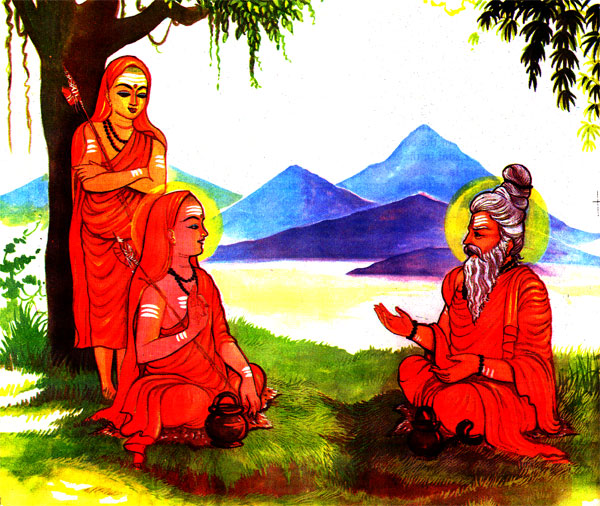How can one define “Hinduism” one may ask. Is it a religion? A philosophy? A collection of myths? A way of life?
Lets look at the term Hinduism first: the fact is that the name “Hindu” was given to the inhabitants of the Indus-Sarasvati civilization by foreigners according to most sources. From there the term Hinduism was given to the amalgam of the original spiritual traditions and practices of the whole of the Indian subcontinent and indeed of many parts of Asia. The true name for Hinduism is “Sanatana Dharma”, meaning the Universal Truth or Eternal Law.
Sanatana Dharma has no specific founder, rather it is the eternal universal matrix of human expression of spirituality.
This awesome knowledge has been handed down through the ages through countless seers, yogis and sages who used their extensive austerities and meditation techniques to discover the eternal secrets and laws of existence, the nature of it and the science to live in harmony with it.
 Hinduism does not believe in the unique authority of one particular scripture, founder or creed alone. It encourages and promotes the individual Experience of the Divine Reality and not blind belief. Hinduism recognises that the Truth is one, but the ways to experience it and connect with it are numerous.
Hinduism does not believe in the unique authority of one particular scripture, founder or creed alone. It encourages and promotes the individual Experience of the Divine Reality and not blind belief. Hinduism recognises that the Truth is one, but the ways to experience it and connect with it are numerous.
Hinduism thus shows that it is a system fully aware of human psychology, as it recognises the individuality of a person’s likes and dislikes, life experiences and spiritual maturity and accordingly provides a way for each individual to live a harmonious life and reach the ultimate goal: Self Realisation and union with the Divine.
Many people question and challenge the concept of innumerable Gods and Goddesses, nature worship, and indeed the many different schools of thought which sometimes vary in their practices and teachings.
Lets look at the analogy of the diamond: a rough raw diamond looks like a dirty piece of glass, however once it has been cut and polished in hundreds of sides and faces, only then can you see and realise its true nature: a priceless jewel.
Likewise, the true and full reality of the Divine can only be realised through the many faces of its expression.
The perfection of the Eternal Law therefore is apparent in the fact that the Divine can be reached through and experienced not only via the chosen deity(s) , Avatar( Divine descent into form to Earth), and/or guru of an individual but also as the abstract aspect (Brahman) and through the energies of nature itself.
Another striking feature of Hinduism is its relevance for and protection of the environment. The reason for this lies in the fact that everything, whether animate or inanimate, is a manifestation of the divine and pervaded by its life spark or energy.
 As such, Sanatana Dharma teaches us to have respect and reverence not only for our fellow human beings but also for animals, the flora and all of nature. As such, the rivers, mountains, and the environment are revered, and not taken as resources to be exploited. Rather, we are only the caretakers of the environment and it is our duty to preserve it.
As such, Sanatana Dharma teaches us to have respect and reverence not only for our fellow human beings but also for animals, the flora and all of nature. As such, the rivers, mountains, and the environment are revered, and not taken as resources to be exploited. Rather, we are only the caretakers of the environment and it is our duty to preserve it.
Another important fact is that Hinduism recognises, respects and worships the female aspect of the divine through the Goddess in her many forms.
Therefore, it should come as no surprise that many ancient Hindu scriptures were composed by female sages. In fact, many great Hindu warriors of India were women who lead very successful and heroic campaigns against invaders and oppressors.
 Hinduism also fosters spiritual and philosophical debates, scientific research and the most advanced forms of all arts. It is the Hindus who gave us the decimal system, geometry and algebra.
Hinduism also fosters spiritual and philosophical debates, scientific research and the most advanced forms of all arts. It is the Hindus who gave us the decimal system, geometry and algebra.
Hinduism also provides us with the sciences of Ayurveda, a complete and holistic medicine system, Yoga, the origins of most of the oriental martial arts in the form of Kalarippayattu, and the greatest and loftiest philosophical treaties such as the Bhagavad Gita and Upanishads, the teachings of which are now starting to be experienced and popularised through Quantum Physics.
Sanatana Dharma can therefore be defined as a religion in its true sense, as the term religion means to connect to the Divine in all its reality.
 It is also a philosophy but most importantly the natural, original way of life for Humanity. All areas of life are covered by Hinduism, from the smallest details about hygiene to the revelation of the nature of the soul, from the instructions to be an ideal king or politician to the science of energetics.
It is also a philosophy but most importantly the natural, original way of life for Humanity. All areas of life are covered by Hinduism, from the smallest details about hygiene to the revelation of the nature of the soul, from the instructions to be an ideal king or politician to the science of energetics.
Hinduism never forbids scrutinising, questioning and adapting as it is a progressive system, which is in total synchronicity with the evolution of nature. Hinduism also does not believe in limitation, because the Divine Reality is limitless.
The Sanatana Dharma is not just for India, or Asia, but it is the eternal well of knowledge which includes many “Pagan” and indigenous/organic spiritual systems, as it encompasses all natural wisdom which is in harmony with the Divine reality of Unity in Diversity
Yogini , Musician ( Guinness world record holder in drumming) and Martial artist

































